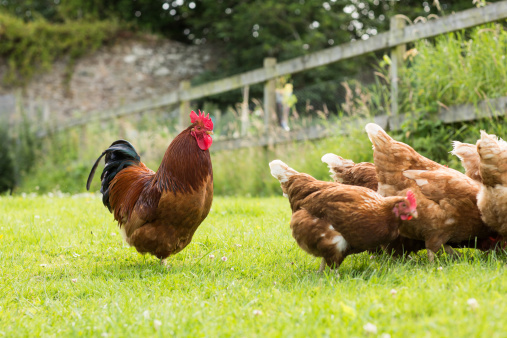How Do Chickens Mate? Chicken Reproduction. Love is in the Coop: A Guide to Chicken Reproduction

How Do Chickens Mate? Some surprising aspects of chicken mating make it possible for families to keep a few hens in suburban and urban areas and enable monstrous operations to produce commercial eggs at low cost.
Imagine the future of suburban chickens if a hen had to have a rooster present to lay eggs.
Egg-Laying Without Roosters
Few cities allow anyone to keep crowing roosters, so it’s fortunate that hens lay eggs whether or not a male is around. Huge factory egg operations are also lucky that hens lay without a rooster present.
If roosters were necessary to stimulate laying, commercial eggeries would need larger facilities to house male birds that eat but don’t lay. Egg costs would be higher!
Roosters’ Role Beyond Mating
Roosters are fun to watch as they strut around the coop showing off their gorgeous feathers. Having one makes keeping chickens more interesting while producing fertile eggs that will hatch.
Roosters protect their hens from intruders. Having a rooster in the flock lets people observe the rather unusual chicken mating process which is very different from how mammals mate.
The Chicken Mating Process: The “Cloacal Kiss”
A rooster often employs a type of foreplay by prancing around the hen and clucking before mounting her. The transfer of sperm happens quickly without the penetration normal in mammal mating. The cloaca, or vent, of the male and female touch and sperm are exchanged.
It’s called a “cloacal kiss” and requires a bit of avian gymnastics for both birds to position themselves so their cloacas meet.
Understanding the Cloaca:
Just what is a cloaca? Unlike humans and most mammals, a female chicken has but one rear orifice with three functions. It is where feces and eggs exit her body and sperm enter. The rooster’s cloaca has only two functions. One is to pass feces. The other is to transfer sperm to a hen.
Adaptations for Hygiene:
Mammals produce liquid urine which leaves the body through the urethra. Urine contains urea. In contrast birds have no need for a urethra since they don’t urinate. Instead they coat their feces with uric acid that exits their body through the cloaca as moist chicken poop.
Advantages of No Liquid Urine:
Not producing liquid urine allows birds to have lighter bodies than mammals of similar size. It is an adaption that helps them fly. Fortunately, the lack of liquid urine makes keeping chickens easier.
If they produced copious urine, bedding would quickly become saturated and smelly if not changed often. Instead, moist chicken feces quickly dries and becomes incorporated into the coop’s bedding. As long as it stays dry changing litter doesn’t need to be done often and the coop stays dry and odor free.
A chicken’s cloaca is an amazing organ. To keep eggs about to be laid away from feces she inverts her oviduct within the cloaca so there is little or no contact inside her body between feces and egg, which comes out clean.
Fertility and Chicken Mating Frequency:
A hen doesn’t need to mate every day in order to lay fertile eggs. She stores sperm in her body and her eggs will be fertile for at least a couple of weeks and sometimes much longer before she needs to re-mate.
One rooster will easily keep eight to a dozen hens fertile.
If hens required a rooster in order to lay, few suburbanites would be able to keep chickens. And, if birds produced liquid urine coops would quickly become smelly and need frequently cleaning. Far fewer suburbanites would be willing to do much more coop cleaning and simply not keep hens. So, these simple adaptations meet several needs.
Explore the world of backyard chicken keeping with confidence by exploring Nutrena’s range of high-quality poultry products. From specialized feeds that promote optimal egg production to innovative solutions for coop cleanliness and bird well-being, Nutrena has your flock’s needs covered. Take your chicken keeping to the next level and ensure happy, healthy hens. Learn more about Nutrena’s poultry products now and give your feathered friends the best care they deserve.
